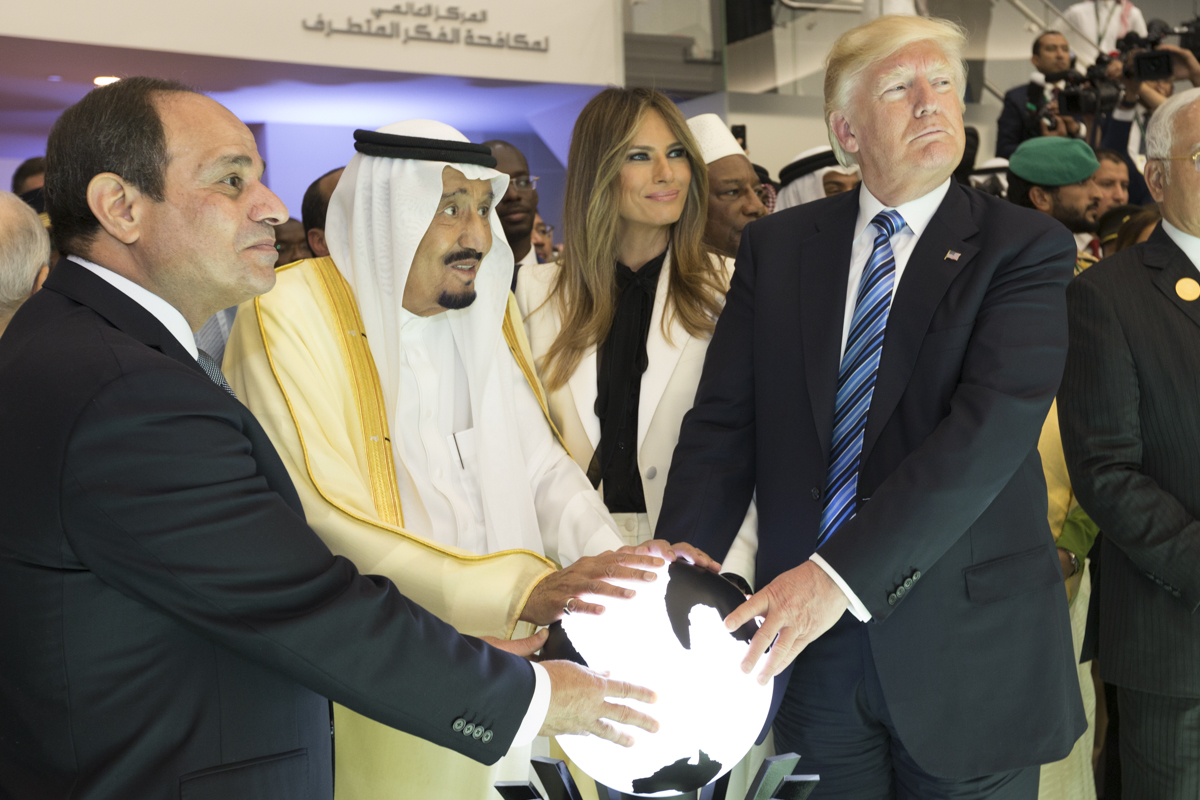This June, five Arab countries, including Saudi Arabia and the United Arab Emirates, severed all diplomatic and economic ties with Qatar. A small Arab Gulf state, Qatar is incredibly wealthy due to its location near several major petroleum deposits, possessing the world’s second highest GDP per capita. Not only did these Arab countries withdraw all diplomats and ambassadors from Qatar, but they also enacted economic sanctions due to Qatar’s alleged funding of Sunni extremist groups, including the Muslim Brotherhood and Hamas.
This is not the first time that Qatar’s neighbors have threatened diplomatic sanctions—in 2014, Saudi Arabia, the U.A.E., and Bahrain withdrew ambassadors from the country. However, one factor distinguishes this new incident from previous sanctions—this time, the sanctions have the support of America’s president, Donald Trump.
While Trump’s foreign policy in the Middle East is not completely defined, throughout the diplomatic crisis he was steadfast in his backing of Saudi Arabia and his opposition to Qatar and Iran. Trump’s hostility to Qatar not only weakens the stability of the Middle East, but also allows other Gulf countries like Saudi Arabia and the U.A.E. to gain more power in the region. At the same time, Trump’s actions also delegitimize the actions of his political appointments, especially Rex Tillerson, Trump’s Secretary of State, whose attempts at mediation clearly contradict Trump’s one-sided rhetoric.
Power Dynamics in the Middle East
While Saudi Arabia has traditionally enjoyed prime trading rights and diplomatic access to the United States, in recent years, it has found its dominance of the Middle East disrupted by several factors, especially the emergence of Qatar as a regional player. Until recently, Saudi Arabia has used organizations like the Gulf Cooperation Council in order to project power in the region. Created in 1981, the GCC linked the key economic powers of the Persian Gulf in a formal union that attempted to prevent political upheaval from emerging in the region in the wake of neighboring Iran’s 1979 revolution. Traditionally, the GCC has been dominated by two countries: Saudi Arabia and the U.A.E. Not only have these two countries received the highest levels of foreign capital flow, but they are also responsible for importing foreign goods and re-exporting these same goods to the rest of the GCC.
Over the past few decades, however, Qatar has circumvented the GCC, choosing to develop its soft power and making foreign policy decisions independent of the GCC. The development of Qatar’s Al Jazeera news network, in particular, has managed to raise the country’s prominence in the region by broadcasting pro-Qatari messages throughout the Middle East. Qatar has used this newfound influence to pursue a renegade brand of diplomacy, choosing to support groups like Hamas and the Muslim Brotherhood during the Arab Spring. In addition, the country has restored full diplomatic relations with Iran, garnering it the ire of its neighbors. This anger was made evident by the list of 13 demands presented to Qatar by Saudi Arabia in July, which called for the nation to cut all ties with such groups like the Muslim Brotherhood. To make things worse, Qatar has backed the wrong side in many regional conflicts—in Egypt, for example, it suffered a blow of credibility when President Mohammed Morsi, a member of the Brotherhood, was toppled from power.
Where does Trump figure into this crisis, then?
Trump and Middle East Foreign Policy
While it is true that America has long regarded Saudi Arabia as an ally—even during the presidency of former President Obama,whose foreign policy called for a more cautious approach to dealing with Saudi Arabia and a willingness to negotiate with Iran—the Saudis have found an especially supportive ally in the form of Donald Trump. In particular, Trump’s decisive opposition to Iran is very much in line with the foreign policy of Saudi Arabia, given that Iran is generally regarded as a hostile contender for regional power by the Saudis. By condoning the blockade on Qatar, Trump has effectively given the Saudis a blank check to act in the region, and tilted the balance of power even further in favor of the Saudis and their allies.
Trump’s embrace of Saudi Arabia has also weakened Qatar’s position as a regional player within the Middle East. Trump was quick to condemn Qatar as a supporter of Islamic extremism immediately following announcement of the blockade, and condoned Saudi Arabia’s actions in another tweet, praising Saudi Arabia’s blockade on Qatar as “perhaps … the beginning of the end to the horror of terrorism!” In fact, on May 2017, President Donald Trump symbolically chose to visit Saudi Arabia as his first destination on his first foreign trip since taking office. While previous presidents have traditionally made their first foreign trips to Mexico, Canada, or other reliable U.S. allies, Trump’s selection of Saudi Arabia demonstrates both a renewed interest in the region and an embrace of Saudi foreign policy.

Traditional dhow ships on the waterfront of old Doha, February 2014.
In essence, Trump’s eagerness to rail against Iran and extremist Islamism during his visit to Saudi Arabia in May gave the Saudi-Emirati coalition an opportunity to move against Qatar, which they seized. In Trump’s speech in Riyadh, he avoided any specific reference to “radical Islamic terrorism”—which he whitewashed simply as “extremism”—and any mention of Saudi Arabia’s funding for their own version of extremist Islam, the ultraconservative Wahhabi sect. Trump also repeatedly denounced Shia Iran for sake of his Sunni hosts, ultimately emboldening Saudi Arabia to move against Qatar by highlighting the latter country’s close ties with Iran.
Ultimately, Trump’s decision to side with Saudi Arabia threatens to further destabilize the Middle East. First, by siding with Saudi Arabia, Trump has effectively stripped America of the support of a valuable counterterrorist ally. While it is true that Qatar has often overlooked the funding of extremist groups outside of the country, the country also hosts the largest US military base in the Middle East. In addition, senior Qatari military officials have worked alongside US military officials in joint counterterrorism discussions. Condoning the Qatari blockade has the effect of giving Saudi Arabia even more leverage, and effectively strips the United States of the strategic variety of options offered by a multiplicity of allies.
Second, single-handedly blaming Iran as a “source of destruction and chaos around the region” merely rekindles the age-old Sunni/ Shia conflict to no good effect. While Iran has long espoused anti-American rhetoric, prominent moderates like President Hassan Rouhani have begun taking power in the country. By condemning Iran, Trump has effectively emboldened Iranian religious hardliners, with the potential of sinking the Middle East into more contentious proxy wars between Saudi Arabia and Iran.
Contradictions from Within: What about Tillerson?
Trump’s unilateral decision concerning the Saudi coalition’s blockade on Qatar also threatens the legitimacy of American officials operating the in the region. In particular, Trump’s rhetoric has called into question the effectiveness and capabilities of Secretary of State Rex Tillerson. While Trump has clearly been in support of the blockade, Tillerson has nonetheless repeatedly called for mediation, and even opposed the blockade initially, on the grounds that the “blockade impeded US military efforts.”
By contradicting his subordinates, Trump has undermined trust in America’s ability to conduct foreign policy, and also risked the credibility of the State Department. Tillerson’s former stint as Exxon-Mobil CEO has given him enough experience to be able to adequately deal with the Gulf crisis. In addition, Tillerson’s push for mediation and reconciliation and his advocacy for a neutral American policy response mirrors the views of the foreign policy establishment. In fact, the resignation of the former U.S. ambassador to Qatar, Dana Shell Smith, serves as an example of the establishment’s displeasure with the president’s actions. Trump’s emphatic declaration of support for the blockade effectively emboldens Saudi Arabia to act with impunity, undermining the current efforts of the State Department to negotiate a possible solution.
The Way Out
Evidence has since emerged suggesting that Trump has adopted a more neutral position on the Gulf crisis. Recently, Trump organized a phone-call between the leaders of Qatar and Saudi Arabia. While the call ultimately failed to produce a substantive solution, quickly escalating to finger-pointing between the two countries, Trump’s attempt at mediation must be noted. While it is true that Trump’s new attempts at reconciliation has caused Saudi Arabia to reject military action against Qatar, his previous support of the Saudi regime has clearly undermined his current efforts at negotiations.
While Trump believes in the possibility of a quick policy solution through dealmaking, his initial actions in Qatar highlight his policy inexperience. Given Trump’s many policy reversals, it seems that the only constant in the foreign policy arena is his constant opposition to Iran. Not only is this policy too simplistic; it also has the potential to further escalate the ongoing conflict between Shia Iran and Sunni Saudi Arabia. Whether Trump has learned anything from the Qatar crisis remains to be seen.
Image credit: Flikr/The White House // Flikr/Francisco Anzola
